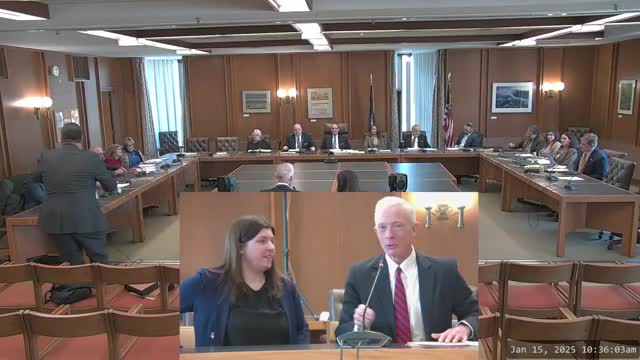Chief Justice McDonald briefs House Judiciary Committee on caseload, security and staffing pressures
Get AI-powered insights, summaries, and transcripts
Subscribe
Summary
Chief Justice Gordon McDonald and Judicial Branch staff told the House Judiciary Committee the courts face growing workloads from youth-development cases, rising security threats, indigent defense shortfalls and new magistrate duties, while the branch advances digital evidence and text-notification pilots.
Chief Justice Gordon McDonald told the House Judiciary Committee on Wednesday that New Hampshire’s courts are managing rising workload and security pressures while implementing several initiatives to improve access and efficiency.
McDonald, joined by Aaron Cregan, general counsel for the judicial branch, gave an overview of court structure, filings and recent changes that included the creation of magistrates and renewed efforts to move toward fully digital case management. “We are comprised of two trial courts, circuit court and superior court, and one appellate court, the supreme court,” McDonald said in his opening remarks.
The judicial branch reported calendar-year 2023 volumes of more than 100,000 filings in the circuit court and roughly 24,000 filings in superior court, with criminal cases the largest single category. McDonald told the committee that the branch is now fully staffed on judges in both courts and added three magistrates in December under House Bill 318; the magistrates began handling weekend bail hearings on Jan. 1.
McDonald highlighted one particularly resource-intensive cluster of cases stemming from investigations into the youth development center. “More than 1,300 cases have been generated from the issues involving the youth development center,” he said, and added those matters are complex and consume substantial staff time.
The chief justice also described persistent access-to-justice challenges: in many circuit-court case types, as many as 90% of litigants are self-represented. He briefed the committee on a new paraprofessional representation program that began last year and which places trained non-attorneys, supervised by lawyers, alongside litigants in high-need case types.
Indigent defense funding and retention was a recurring concern. McDonald said the public defender office has seen a sharp decline in retention and that the judicial council estimates an approximate $8.3 million gap to restore competitiveness and staffing. He told the committee that the Legislative Budget Assistant’s audit found dozens of incarcerated defendants awaiting appointment of counsel on any given day.
On security, the chief justice said threats against courthouses and court personnel have increased and that the branch is deploying site-by-site physical assessments funded with ARPA dollars and training court security officers through the Police Standards and Training Council.
McDonald closed by describing technology and service pilots: digital presentation of evidence in superior court and text-message reminder pilots designed to reduce failure-to-appear rates. He offered to provide follow-up materials on land-use docket statistics and other detailed counts members requested.
Ending: Committee members asked follow-up questions about magistrate caseloads, public defender pay, and how the branch is preparing for increased digital reliance. McDonald said the branch will deliver additional statistics on land-use docket volume, filings and the magistrates’ early experience.
